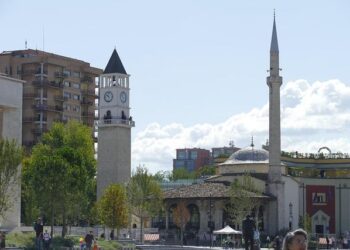In recent years, a growing number of Americans have sought financial relief by relocating abroad, drawn by lower living costs and new opportunities. Among them is a wave of young professionals who have moved to countries like Argentina, aiming to stretch their dollars further and tackle mounting student debt. While the economic benefits of such a move can be significant, the experience is often more complex than anticipated. In this report, we explore one individual’s journey from the United States to Argentina, revealing how the promise of affordability helped chip away at student loans-but also exposed unexpected challenges beneath the surface.
Moving to Argentina unlocked financial freedom by slashing living expenses and accelerating student debt repayment
Relocating to Argentina drastically cut my monthly expenses, allowing me to funnel almost twice the amount I used to pay into my student loans each month. Basic costs such as rent, groceries, and transportation came at a fraction of the price compared to major U.S. cities. For instance, a comfortable one-bedroom apartment in Buenos Aires cost me less than half of what I paid in my previous U.S. apartment. This economic reprieve provided the financial breathing room necessary to create an aggressive repayment plan that rapidly reduced my outstanding debt, something that seemed nearly impossible back home.
But the savings came with a price beyond mere currency conversion. Navigating Argentina’s economic volatility, like inflation rates soaring above 50%, meant my budgeting strategy had to be constantly agile. Additionally, cultural differences and logistical challenges – from language barriers to fluctuating internet reliability – added layers of complexity to daily life. Living abroad demanded resilience in ways that extended well beyond financial benefits.
- Rent in Buenos Aires: $400/month vs. $1,200/month in U.S.
- Groceries: 60% cheaper than U.S. averages
- Monthly loan repayment increase: 90%
| Expense Category | Argentina ($) | U.S. ($) |
|---|---|---|
| Rent (1-bedroom) | 400 | 1,200 |
| Monthly Groceries | 150 | 380 |
| Transportation | 20 | 100 |
Navigating cultural challenges and unexpected hurdles while adapting to life abroad
Adjusting to life in Argentina, despite the financial relief, was a complex journey laced with unforeseen challenges. Language barriers often led to frustrating misunderstandings, especially when dealing with government offices or healthcare providers. Beyond communication, the cultural rhythm itself – from siesta hours to the informal approach to punctuality – demanded a flexible mindset. Social customs that once felt welcoming sometimes morphed into isolating experiences, underscoring how cultural nuances can subtly affect everyday interactions.
Unexpected hurdles also arose in navigating bureaucratic processes, which contrasted sharply with the more streamlined systems back home. The reliance on personal connections and informal networks for accessing services became a double-edged sword. Below is a snapshot of specific cultural and logistical challenges that were most common:
| Challenge | Description | Impact |
|---|---|---|
| Bureaucratic delays | Lengthy wait times for documentation and approvals | Increased stress and disrupted plans |
| Informal communication | Reliance on word-of-mouth and personal references | Difficulty accessing official information |
| Social integration | Complex cultural norms around friendships and trust | Feelings of isolation at times |
- Adapting daily routines required patience and a willingness to embrace new social norms.
- Building local support networks took effort but was crucial for smoother acclimation.
- Maintaining mental health emerged as a priority amid the cultural and logistical stressors.
Expert advice for Americans considering relocation to maximize benefits and avoid common pitfalls
Before making the leap abroad, Americans should meticulously evaluate financial and logistical factors to truly maximize benefits. Consider the cost of living adjustments alongside currency stability; while Argentina offers a notably lower expense baseline, fluctuating exchange rates can erode savings unexpectedly. Additionally, understanding local healthcare systems and insurance requirements is critical-especially for those with pre-existing conditions or ongoing treatments. It’s wise to consult expat communities and financial advisors who specialize in cross-border relocations to map out realistic budgets and uncover hidden expenses like international banking fees or tax implications.
To avoid common pitfalls, prioritize these key steps:
- Legal residency status: Secure the proper visa early to prevent disruptions.
- Tax obligations: Maintain compliance with IRS regulations, including the Foreign Earned Income Exclusion.
- Emergency planning: Establish a reliable communication channel with family and build an exit strategy in case of political or economic instability.
- Cultural acclimation: Learn local customs and language basics to ease integration and reduce isolation.
| Aspect | US | Argentina |
|---|---|---|
| Monthly Rent (1 Bed Apt) | $1,200 | $350 |
| Healthcare Cost | High | Moderate |
| Currency Volatility | Low | High |
| Internet Speed | Very Fast | Moderate |
In Summary
Relocating to Argentina offered a viable solution for reducing living expenses and accelerating debt repayment, a growing trend among Americans burdened by student loans. However, as this experience reveals, the decision to live abroad carries complexities that extend beyond financial relief. Challenges such as cultural adjustment, legal hurdles, and unexpected personal costs highlight the nuanced reality behind the pursuit of affordability overseas. For those considering a similar move, thorough research and careful planning remain essential to navigating both the benefits and drawbacks of international relocation.
















